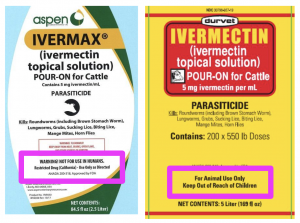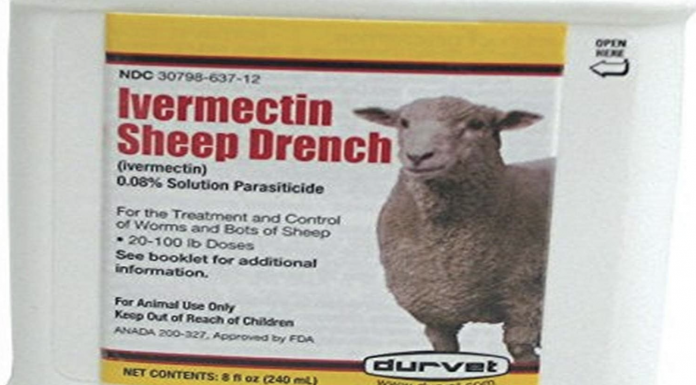Q: Should I take ivermectin to prevent or treat COVID-19?
A: No. While there are approved uses for ivermectin in people and animals, it is not approved for the prevention or treatment of COVID-19.
You should not take any medicine to treat or prevent COVID-19 unless it has been prescribed to you by your health care provider and acquired from a legitimate source.
A recently released research articleExternal Link Disclaimer described the effect of ivermectin on SARS-CoV-2 in a laboratory setting.
These types of laboratory studies are commonly used at an early stage of drug development. Additional testing is needed to determine whether ivermectin might be appropriate to prevent or treat coronavirus or COVID-19.
Q: Is there an emergency use authorization for ivermectin in the U.S. to prevent or treat coronavirus or COVID-19?
A: No. FDA has created a special emergency program for possible therapies, the Coronavirus Treatment Acceleration Program (CTAP). It uses every available method to move new treatments to patients as quickly as possible, while at the same time finding out whether they are helpful or harmful.
We continue to support clinical trials that are testing new treatments for COVID so that we can gain valuable knowledge about their safety and effectiveness.
Q: What is ivermectin approved for in the U.S.?
A: Ivermectin tablets are approved for use in humans for the treatment of some parasitic worms (intestinal strongyloidiasis and onchocerciasis) and ivermectin topical formulations are approved for human use by prescription only for the treatment of external parasites such as headlice and for skin conditions such as rosacea.
Ivermectin is FDA-approved for use in animals for prevention of heartworm disease in some small animal species, and for treatment of certain internal and external parasites in various animal species.
People should never take animal drugs, as the FDA has only evaluated their safety and effectiveness in the particular species for which they are labeled. Using these products in humans could cause serious harm.
Q: Is there any danger to humans taking ivermectin?
A: There are approved uses for ivermectin in people and animals but it is not approved for the prevention or treatment of COVID-19. You should not take any medicine to treat or prevent COVID-19 unless it has been prescribed to you by your health care provider and acquired from a legitimate source … (continue reading below)
 Some of the side-effects that may be associated with ivermectin include skin rash, nausea, vomiting, diarrhea, stomach pain, facial or limb swelling, neurologic adverse events (dizziness, seizures, confusion), sudden drop in blood pressure, severe skin rash potentially requiring hospitalization and liver injury (hepatitis).
Some of the side-effects that may be associated with ivermectin include skin rash, nausea, vomiting, diarrhea, stomach pain, facial or limb swelling, neurologic adverse events (dizziness, seizures, confusion), sudden drop in blood pressure, severe skin rash potentially requiring hospitalization and liver injury (hepatitis).
Laboratory test abnormalities include decrease in white cell count and elevated liver tests. Any use of ivermectin for the prevention or treatment of COVID-19 should be avoided as its benefits and safety for these purposes have not been established. Data from clinical trials are necessary for us to determine whether ivermectin is safe and effective in treating or preventing COVID-19.
Q: What should I do if the ivermectin products I purchase for use in my animals are not available at my typical retailer?
A: Ivermectin is an important part of a parasite control program for certain species and should only be given to animals for approved uses or as prescribed by a veterinarian in compliance with the requirements for extra-label drug use. Due to potentially elevated interest in ivermectin following the new research, some products may not be available. If you are having difficulty locating a particular ivermectin product for your animal(s), the FDA recommends that you consult with your veterinarian.
Q: What is the FDA doing to protect people from fraudulent COVID-19 products?
A: We have established a cross-agency task force dedicated to closely monitoring for fraudulent COVID-19 products. We have reached out to major retailers to ask for their help in monitoring online marketplaces for fraudulent COVID-19 products.
Products sold are subject to FDA investigation and potential enforcement action if they claim to prevent, diagnose, treat, or cure COVID-19 and have not demonstrated safety and effectiveness for that intended use. The task force has already worked with retailers to remove dozens of these types of product listings online.
The FDA and the Federal Trade Commission (FTC) issue warning letters to companies that violate federal law and pose significant risks to patient health by selling unapproved products with fraudulent claims to treat or prevent COVID-19. View the warning letters for more information.
FDA Letter to Stakeholders:
Do Not Use Ivermectin Intended for Animals as Treatment for COVID-19 in Humans
April 10, 2020
Dear Stakeholder,
The FDA’s Center for Veterinary Medicine has recently become aware of increased public visibility of the antiparasitic drug ivermectin after the announcement of a research article that described the effect of ivermectin on SARS-CoV-2 in a laboratory setting. The Antiviral Research pre-publication paper, “The FDA-approved drug ivermectin inhibits the replication of SARS-CoV-2 in vitroExternal Link Disclaimer,” documents how SARS-CoV-2 (the virus that causes COVID-19) responded to ivermectin when exposed in a petri dish.
This type of study is commonly used in the early stages of drug development. Ivermectin was not given to people or animals in this study. Additional testing is needed to determine whether ivermectin might be safe or effective to prevent or treat coronavirus or COVID-19.
Ivermectin tablets are approved for use in people for the treatment of some parasitic worms (intestinal strongyloidiasis and onchocerciasis) and ivermectin topical formulations are approved for human use by prescription-only for the treatment of external parasites such as headlice and skin conditions such as rosacea.
Ivermectin is FDA-approved for use in animals for prevention of heartworm disease in some small animal species, and for treatment of certain internal and external parasites in various animal species.
FDA is concerned about the health of consumers who may self-medicate by taking ivermectin products intended for animals, thinking they can be a substitute for ivermectin intended for humans.
People should never take animal drugs, as the FDA has only evaluated their safety and effectiveness in the particular animal species for which they are labeled. These animal drugs can cause serious harm in people. People should not take any form of ivermectin unless it has been prescribed to them by a licensed health care provider and is obtained through a legitimate source.
Ivermectin is an important part of a parasite control program for certain species and should only be given to animals for approved uses or as prescribed by a veterinarian in compliance with the requirements for extra-label drug use. Due to potentially elevated interest in ivermectin following the new research, some products may not be available. If you are having difficulty locating a particular ivermectin product for your animal(s), the FDA recommends that you consult with your veterinarian.
The FDA has established a cross-agency task force dedicated to closely monitoring for fraudulent COVID-19 products that reaches out to major retailers to ask for their help in monitoring online marketplaces. Products that claim to prevent, diagnose, treat, or cure COVID-19 are subject to FDA investigation and potential enforcement action if they have not demonstrated safety and effectiveness for that intended use. The task force has already worked with retailers to remove dozens of these types of product listings online.
Please help us protect public health by alerting FDA of anyone claiming to have a product to prevent or cure COVID-19 and to help safeguard human and animal health by reporting any of these products to [email protected] or 1-888-InfoFDA (1-888-463-6332).
We recognize this is a challenging time and urge you to continue practicing social distancing by sharing this information electronically.
Thank you for your support. Please stay safe and healthy.
Dr. Steven Solomon
Director of FDA’s Center for Veterinary Medicine



